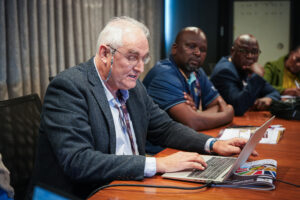
Prof Stephen Devereux is a Principal Investigator with the CoE-FS. Photo Icon Media Productions/CoE-FS.
At the 5th International Social Justice Conference, held recently in Cape Town, Professor Stephen Devereux delved into the normalisation of hunger in South Africa, an issue plaguing the country, particularly black South Africans. He explained that hunger in South Africa is not just prevalent; it has become an accepted reality.
“Hunger has become normalised,” said Professor Devereux, who holds the NRF South African Research Chair (SARChI) in Social Protection for Food Security, affiliated with the DSI-NRF Centre of Excellence in Food Security (CoE-FS), and the Institute for Social Development at the University of the Western Cape (UWC).
Devereux delivered his presentation, ‘How the normalisation of hunger prevents achieving the justice of eating in South Africa’ during a conference parallel session, “Hunger, poverty, the economy, and social justice”.
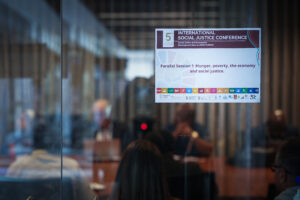
The session was one of many at the 5th International Social Justice Conference, hosted by the Centre for Social Justice at Stellenbosch University. Photo Icon Media Productions/CoE-FS.
For his presentation, Devereux delved into the structural and systemic issues that perpetuate food insecurity in the country. He pointed out that, despite South Africa’s status as an upper-middle-income country and its self-sufficiency in staple food production, millions of South Africans — particularly those in black communities — continue to face chronic and seasonal hunger.
“Black South Africans have a serious hunger problem,” he said, underscoring the racial disparities that exacerbate food insecurity.
A reflection of structural inequality
Devereux, who is based at the Institute of Development Studies, introduced the concept of the “Foucauldian process of normalisation”, a reference to the work of French philosopher Michel Foucault. He argued that hunger in South Africa has become so deeply ingrained in the social fabric, that it is no longer seen as an urgent crisis but as a normal part of everyday life for millions of people.
“Historic hierarchies are built into the system,” Devereux explained, adding that these hierarchies, rooted in the racial and economic divisions of the past, continue to shape the present.
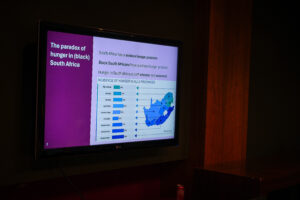
Despite South Africa’s status as an upper-middle-income country and its self-sufficiency in staple food production, millions of South Africans — particularly those in black communities — continue to face chronic and seasonal hunger. Photo Icon Media Productions/CoE-FS.
The normalisation of hunger, he argued, prevents society from addressing the justice of eating: a concept that highlights the ethical imperative of ensuring that everyone has access to sufficient, nutritious food.
Obstacle to social justice and equity
The normalisation of hunger presents a significant obstacle to achieving social justice and equity in South Africa. While the country’s constitution guarantees the right to food, this right remains out of reach for millions of South Africans.
Devereux pointed out that South Africa has one of the most comprehensive social protection systems in Africa; yet, it has not been able to eradicate hunger. The reasons for this are complex and multi-faceted, ranging from inadequate social protection benefits to deep-rooted economic inequalities that disproportionately affect black communities.
“The paradox is that South Africa has a serious hunger problem but we shouldn’t have a hunger problem at all,” he said.
“To be more precise: black South Africa has a serious hunger problem; it’s not a problem that white people face.”
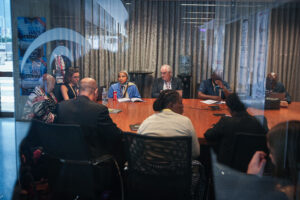
Prof Stephen Devereux argued that hunger in South Africa has become so deeply ingrained in the social fabric, that it is no longer seen as an urgent crisis. Photo Icon Media Productions/CoE-FS.
South Africa’s hunger problem is also both chronic and seasonal. For example, farmworkers, particularly seasonal labourers, face heightened food insecurity during off-seasons when employment opportunities dwindle. This seasonal hunger is further exacerbated by the cyclical nature of poverty, as these workers often lack access to stable income, healthcare, and education, which could help break the cycle of hunger.
Devereux emphasised that any meaningful solution to hunger in South Africa must take into account these seasonal and systemic factors, addressing not only the symptoms of hunger, but its root causes.
“We have more than enough food in the country. The problem is that it’s not efficaciously distributed.”
Achieving food justice
One of the central themes of Devereux’s presentation was the concept of “food justice”, the idea that everyone has a right to sufficient, healthy food and that achieving this requires addressing broader issues of economic and social inequality. He argued that achieving food justice is not only a matter of providing immediate relief through food aid but also about tackling the systemic inequalities that make hunger a persistent problem in South Africa.
To achieve food justice, Devereux suggested a range of policy interventions, including improving social protection systems, expanding access to land for food production, and increasing investment in rural development.
He also called for greater collaboration between government, civil society, and the private sector to create sustainable solutions to hunger.
“We cannot address hunger in isolation,” Devereux said. “It is tied to broader issues of social justice and economic inequality, and we must address these issues simultaneously if we are to achieve the justice of eating.”
Advancing social justice
Joining the SARChI chairholder in the session was Alfa Mahlako, chief director of Poverty Alleviation, Sustainable Livelihoods, and Food Security at the National Department of Social Development; and Mlondi Mveli Mdluli, a PhD candidate at the University of Reading and a member of parliament for the Democratic Alliance. Together, they explored the intersection of hunger, poverty, and economic inequality in South Africa. The session was moderated by Phelisa Nkomo, a development economist and expert in gender equity and inclusion.
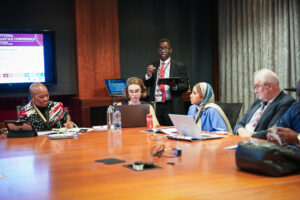
Fellow panellists were Alfa Mahlako, chief director of Poverty Alleviation, Sustainable Livelihoods, and Food Security at the National Department of Social Development; and Mlondi Mveli Mdluli, a PhD candidate at the University of Reading and a member of parliament for the Democratic Alliance. The session was moderated by Phelisa Nkomo. Photo Icon Media Productions/CoE-FS.
The session was one of many at the 5th International Social Justice Conference, which was hosted by the Centre for Social Justice at Stellenbosch University. The CoE-FS and the UNESCO Chair in Science and Education for African Food Systems, held by the CoE-FS’s director Professor Julian May, joined as partners. The CoE-FS also hosted a panel discussion on activist lawfare, featuring movement builder Zackie Achmat, the District Six Museum’s head of education Mandy Sanger, the Healthy Living Alliance’s interim CEO Nzama Mbalati, political analyst Asanda Ngoasheng, and intersectional climate justice activist Gabriel Klaasen.
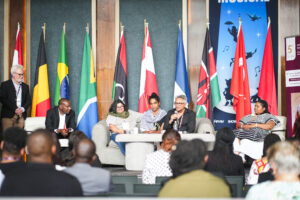
The activist lawfare discussion was facilitated by CoE-FS director, Prof Julian May. Photo Icon Media Productions/CoE-FS.
The conference, with its theme centred on “Social Justice and the Sustainable Development Goal on Zero Hunger,” aimed to address critical challenges in eradicating hunger globally, with a specific focus on South Africa.
The opening plenary featured speakers such as Dr Marlene Le Roux, Justice Edwin Cameron, and Professor Thuli Madonsela, all of whom have played key roles in advancing social justice in various spheres of South African society.
related Articles
What would an anti-hunger budget have looked like?
Dr Busiso Moyo is a postdoctoral researcher with Union Against Hunger (UAH) founder-member, the DSTI-NRF Centre of Excellence in Food…
Union Against Hunger: Academia, civil society join forces to combat a ‘slow...
The Union Against Hunger is a coalition of forces from academia and civil society. Photo Alaister Russell/CoE-FS. The recently launched…
Hunger as a weapon: in war and at home
Displaced women making bread during the humanitarian pause in Khan Younis. UNRWA photo by Ashraf Amra. From Gaza and Ethiopia,…



